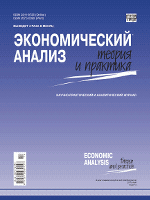Abstracting and IndexingРИНЦReferativny Zhurnal VINITI RAS Worldcat Google Scholar Online availableEastvieweLIBRARY.RU Biblioclub |
A project-based approach as a method of improving economic efficiency of high-tech industrial enterprises
Available online: 16 September 2014 Subject Heading: METHODS OF ANALYSIS JEL Classification: Pages: 2-16
The article investigates the project-based approach capabilities for strategic management and improving productivity, competitiveness and innovation of modern high-tech industrial enterprises. The developing globalization processes in the economy and enhancing competition in both local and global markets have a continuous impact on toughening management quality requirements. Therefore, the ability of enterprises to permanently monitor the practical results of their activities becomes increasingly important. By adapting to the changed environment, the enterprises change their structure and transform into ultra-large transnational corporations, which are engaged in various activities that often are completely unrelated to each other. The management system faces increasingly complicated tasks: in addition to regulation and building functions of one or several similar business units, it is necessary to build communications and functionality in dozens of different business units. The authors note that the modern economic science lacks a clear classification of main approaches to business management. However, sticking to the system approach to management it is possible to distinguish a structural, functional, process, situation and a project-based approach as main approaches to company management. Harmonizing project and process approaches plays an important role for company performance enhancement. The paper formulates three main steps, which are necessary to ensure a balanced combination of process and project activities of a company: developing the structure of company's operating activity; creating mechanisms to implement a process in the form of a project; using mechanisms of unified project implementation. Solutions to many industrial problems lie in the area of strategic project management, which aims at translating a company's strategy into an integrated investment portfolio of projects and programs, as well as managing the solutions of strategic tasks at individual project implementation level. The conditions of uncertainty or incoherence of choice give rise to the issues related to building a system of criteria and assessment to support a viable and balanced portfolio of projects, taking into account organization's strategic goals, investment attractiveness and risks inherent in the projects. Since the late 90's and early 2000's, the majority of international companies have been moving from traditional hierarchy structures to "flat", quick, expeditious and more maneuverable horizontal structures based on teams and projects, which can quickly adapt to rapidly changing markets and technologies. In the final part of the article the authors analyze the success of using the project-based approach by a number of leading international companies. Keywords: high-tech enterprise, strategic management, project-based approach, economic efficiency, innovation References:
|
ISSN 2311-8725 (Online)
|
|








